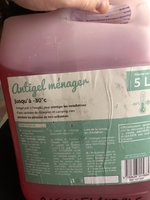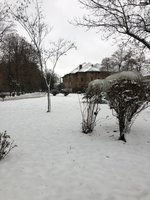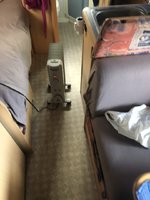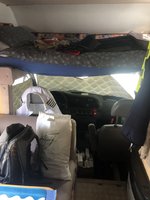RCW
Free Member
- Messages
- 208
I’d personally like to thank everybody for the help the other day pertaining my motorhome electric/battery questions.
Hopefully this will be my last dumb question of the year, thanks of this bearing with me / tolerating lol.
soooooo, we are going into winter and like a good chap I drained the “grey water” , opened the taps, drained the sink , shower and toilet tap and patted myself on the back after emptying the grey water tank.
As I got on my flight back on Swiss for work (I’m a aviation consultant) I said , oh bugger I didn’t drain the fresh water tank which is 100L / basically full.
I’m back at the weekend on the Swiss/Austrian border but temperatures will be around -4 degrees C. I’m told by a merchant today I purchased “fresh water anti-ice from to add this to my tank.
Image 1, it does have some heating take and is pretty thick and well above ground.
his ,,,, proposal to avoid any damage;
1) turn on the electric oil heater for two days inside the van.
2) Get temps up, use a hair dryer on low around the taps before the fresh water goes on day 3.
3) place a cheap electric night blanket around the water tank under the van and tape it on , or a low Watt heat Light/lamp .
4) add picture one to the water to keep it from freezing. Will treat any light icing in the tank. (Wasn’t cheap at €50 for 5L but treats 2 tanks, I won’t be using the Vans water much whilst on site with facility’s anyhow)
basically don’t want to run the risk of any frozen pipes or messing up the boiler.
Any suggestions very much welcome and I’m looking forward to actually posting some more enjoyable trip posts/pics “and joining as a full
Member of course” as opposed to asking the community about my stupidity.
i’m supposed to be enjoying van life not worrying and turning gray.
With regards from the Swiss/Austrian border.
Rob

Hopefully this will be my last dumb question of the year, thanks of this bearing with me / tolerating lol.
soooooo, we are going into winter and like a good chap I drained the “grey water” , opened the taps, drained the sink , shower and toilet tap and patted myself on the back after emptying the grey water tank.
As I got on my flight back on Swiss for work (I’m a aviation consultant) I said , oh bugger I didn’t drain the fresh water tank which is 100L / basically full.
I’m back at the weekend on the Swiss/Austrian border but temperatures will be around -4 degrees C. I’m told by a merchant today I purchased “fresh water anti-ice from to add this to my tank.
Image 1, it does have some heating take and is pretty thick and well above ground.
his ,,,, proposal to avoid any damage;
1) turn on the electric oil heater for two days inside the van.
2) Get temps up, use a hair dryer on low around the taps before the fresh water goes on day 3.
3) place a cheap electric night blanket around the water tank under the van and tape it on , or a low Watt heat Light/lamp .
4) add picture one to the water to keep it from freezing. Will treat any light icing in the tank. (Wasn’t cheap at €50 for 5L but treats 2 tanks, I won’t be using the Vans water much whilst on site with facility’s anyhow)
basically don’t want to run the risk of any frozen pipes or messing up the boiler.
Any suggestions very much welcome and I’m looking forward to actually posting some more enjoyable trip posts/pics “and joining as a full
Member of course” as opposed to asking the community about my stupidity.
i’m supposed to be enjoying van life not worrying and turning gray.
With regards from the Swiss/Austrian border.
Rob




